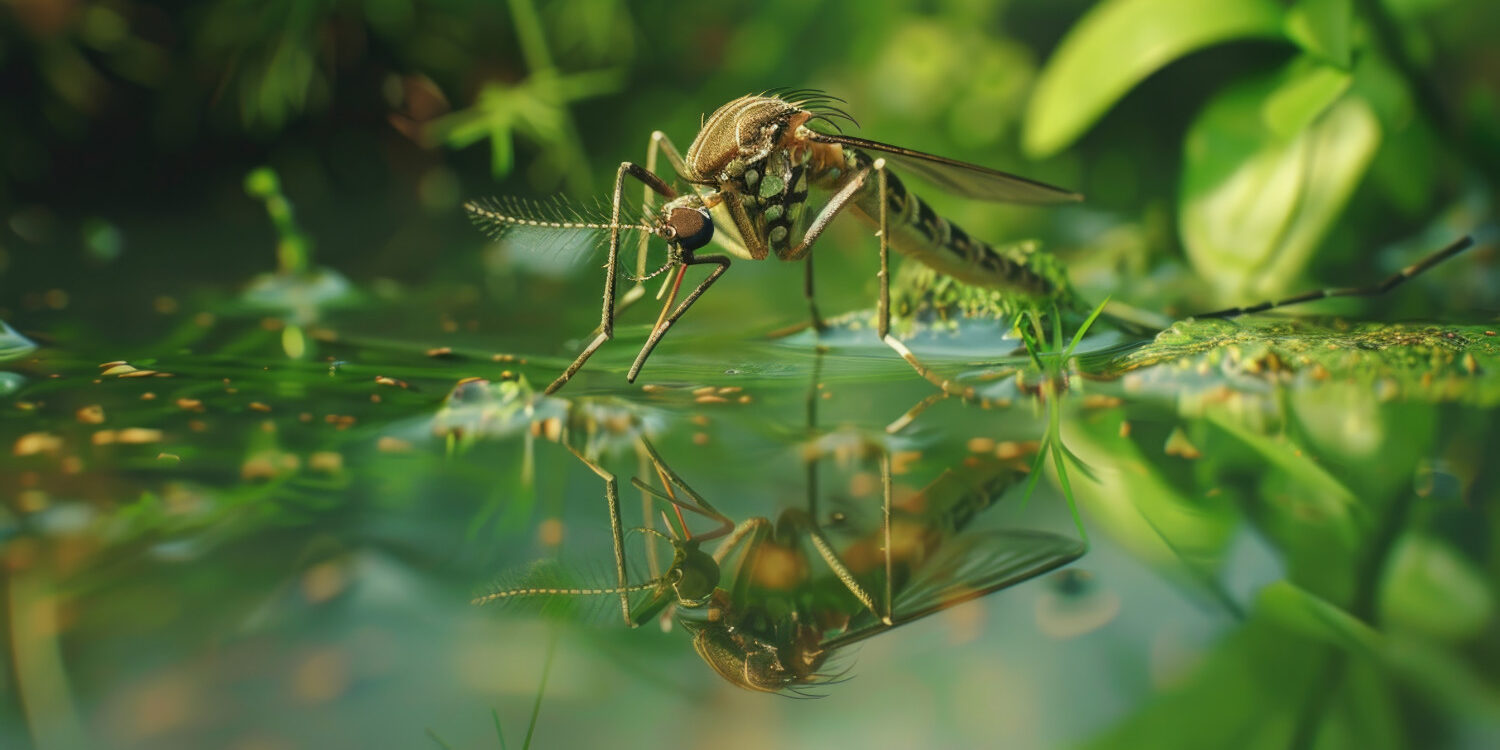Summer in Manitoba is a time for enjoying the outdoors, but those pesky mosquitoes can quickly turn a backyard BBQ into an itchy nightmare. Did you know that your lawn care routine can play a major role in reducing mosquito populations? Let’s dive into our mosquito control tips and how you can maintain a beautiful lawn while minimizing those unwanted guests.
Why Mosquitoes Love Your Yard?
Mosquitoes find your yard particularly appealing for a few reasons. They are drawn to moisture, shade, and areas where water can collect. Tall grass, overgrown shrubs, and debris provide ideal safe havens, while standing water in birdbaths, gutters, or even overturned toys and tires becomes a breeding ground. By understanding their preferences, you can take targeted steps to make your yard less hospitable and reclaim your outdoor space.
12 Easy Mosquito Control Tips
Transform your yard from a mosquito haven to a pest-free paradise. By making your lawn less inviting, you’ll significantly reduce mosquito populations and enjoy a more comfortable outdoor space. Here’s a few simple maintenance tips:
- Mow Regularly: Keep your grass short – medium, as mosquitoes prefer taller grasses for shelter. Aim for a height of 2.5 to 3 inches.
- Remove Weeds: Weeds create dense, damp areas where mosquitoes love to hide. Removing them not only improves your lawn’s appearance but also eliminates these mosquito sanctuaries, making your yard less hospitable.
- De-Thatch: Thatch is a layer of dead grass and debris that traps moisture. Aerating and dethatching your lawn can help.
- Eliminate Standing Water: Mosquitoes can breed in as little as a bottle cap of water. Clean and change bird baths and kids’ pools regularly, and even empty overturned toys after it rains. Even turning over or removing old tires will help.
- Trim Trees and Shrubs: Overgrown vegetation creates shaded areas where mosquitoes thrive. Trim back branches and shrubs to let more sunlight in.
- Fill In Holes: Fill in low lying areas where water accumulates to eliminate their breeding grounds.
- Clear Eavestroughs & Drains: Clogged eavestroughs and drains can accumulate water, creating ideal breeding grounds for mosquitoes. Keeping them clear ensures water flows freely, preventing it from pooling and attracting mosquitoes to your property.
- Chlorinate Pools: Proper pool chlorination helps maintain a healthy pool ecosystem that prevents buildup of organic matter which mosquito larvae feed on. The constant circulation of chlorinated water makes it difficult for larvae to thrive.
- Reduce Wind Screens & Features: Though mosquitoes have wings they are not strong fliers. Reduce wind screens to create more open spaces that allow wind to freely flow. This will significantly hamper mosquitoes’ ability to invade your yard.
- Add Mosquito Repellent Plants: Place fragrant options like alliums, mums, marigolds, mint, and basil around your outdoor living spaces. While these plants are a great deterrent, they don’t always emit strong smells, so consider layering in additional mosquito protection.
- Help Mosquito Predators: Attract mosquito-eating animals to your yard by providing suitable habitats. Invite birds with birdhouses and even leave some spider webs intact.
- Mulch With Cedar: Known for its insect-repelling aroma, cedar mulch can be a powerful tool against mosquitoes. The scent from the wood’s natural oils will fade over time, but while it lasts, this mulch can deter mosquitoes from gathering in flower beds and around your yard.
Natural Mosquito Repellents
If you’re looking for natural solutions, consider planting mosquito-repelling plants like citronella, lavender, or marigolds around your yard. You can also try using essential oils like lemon eucalyptus or peppermint.
Important Note: While natural repellents can help, they may not be as effective as commercial products containing DEET or Icaridin, particularly in high-risk WNV areas.
What is West Nile Virus?
While relatively new to Manitoba, is a mosquito-borne illness that poses a potential risk. Fortunately, most individuals who are bitten by an infected mosquito experience no symptoms or only mild ones. However, it’s important to be aware that WNV can, in rare cases, lead to serious complications and even be fatal. For detailed information and updates on WNV risk in Manitoba, please refer to the resources provided by Manitoba Health.
What the City is Doing?
The City of Winnipeg monitors mosquito populations and implements larviciding programs to reduce breeding in standing water. They may also conduct fogging operations in certain areas if the risk of WNV is high.
What You Can Do:
- Be aware of the latest WNV risk assessments from the city.
- Wear long sleeves and pants during peak mosquito hours, especially at dusk and dawn.
- Use mosquito repellent containing DEET or Icaridin.
Professional Lawn Care Help
If you’re struggling with mosquito control, Green Green Grass offers effective mosquito control solutions tailored to Manitoba’s unique environment. Our trained technicians can assess your property and recommend a program to help you reclaim your yard this summer.
Reclaim Your Summer!
With a little effort and the right knowledge, you can have a lush, green lawn that’s less attractive to mosquitoes. So, fire up the grill, invite your friends and family, and enjoy the beautiful Manitoba summer without the constant threat of bites!
Contact us today for a free lawn care consultation and let us help you control those pesky mosquitoes!
FAQs
Green Green Grass uses products that are registered and approved for use in Canada. When applied correctly by our trained technicians, they are safe for pets and children. However, it’s always a good idea to keep children and pets indoors during application and for a short time afterward, as a precaution.
The frequency of mosquito treatments depends on several factors, including the severity of the infestation, weather conditions, and the specific products used. Typically, treatments are applied every 3-4 weeks during peak mosquito season for optimal control.
Yes! Continue to follow the lawn care tips mentioned in this article, such as eliminating standing water and trimming overgrown vegetation. You can also inform your neighbours about the treatment, so they can take appropriate precautions if necessary.

